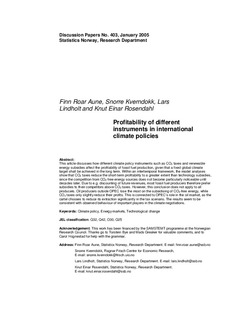| dc.contributor.author | Aune, Finn Roar | |
| dc.contributor.author | Kverndokk, Snorre | |
| dc.contributor.author | Lindholt, Lars | |
| dc.contributor.author | Rosendahl, Knut Einar | |
| dc.date.accessioned | 2011-11-22T19:09:28Z | |
| dc.date.available | 2011-11-22T19:09:28Z | |
| dc.date.issued | 2005 | |
| dc.identifier.issn | 1892-753x | |
| dc.identifier.uri | http://hdl.handle.net/11250/180193 | |
| dc.description.abstract | Abstract:
This article discusses how different climate policy instruments such as CO2 taxes and renewable
energy subsidies affect the profitability of fossil fuel production, given that a fixed global climate
target shall be achieved in the long term. Within an intertemporal framework, the model analyses
show that CO2 taxes reduce the short-term profitability to a greater extent than technology subsidies,
since the competition from CO2-free energy sources does not become particularly noticeable until
decades later. Due to e.g. discounting of future revenues, most fossil fuel producers therefore prefer
subsidies to their competitors above CO2 taxes. However, this conclusion does not apply to all
producers. Oil producers outside OPEC lose the most on the subsidising of CO2-free energy, while
CO2 taxes only slightly reduce their profits. This is connected to OPEC’s role in the oil market, as the
cartel chooses to reduce its extraction significantly in the tax scenario. The results seem to be
consistent with observed behaviour of important players in the climate negotiations. | no_NO |
| dc.language.iso | eng | no_NO |
| dc.publisher | Statistics Norway, Research Department | no_NO |
| dc.relation.ispartofseries | Discussion Papers;No. 403 | |
| dc.subject | Climate policy | no_NO |
| dc.subject | Energy markets | no_NO |
| dc.subject | Technological changes | no_NO |
| dc.subject | Climate negotiations | no_NO |
| dc.subject | Greenhouse gases | no_NO |
| dc.subject | CO2 taxes | no_NO |
| dc.subject | Renewable energy subsidies | no_NO |
| dc.subject | Fossil fuel production | no_NO |
| dc.subject | Oil production | no_NO |
| dc.subject | JEL classification: Q32 | no_NO |
| dc.subject | JEL classification: Q42 | no_NO |
| dc.subject | JEL classification: O30 | no_NO |
| dc.subject | JEL classification: Q25 | no_NO |
| dc.title | Profitability of different instruments in international climate policies | no_NO |
| dc.type | Working paper | no_NO |
| dc.subject.nsi | VDP::Social science: 200::Economics: 210::Economics: 212 | no_NO |
| dc.source.pagenumber | 36 s. | no_NO |
